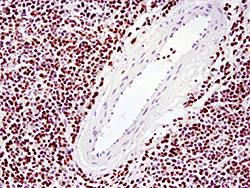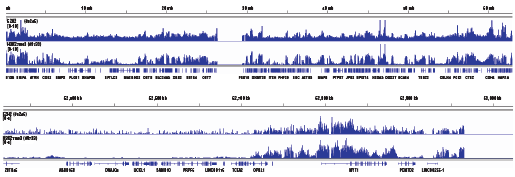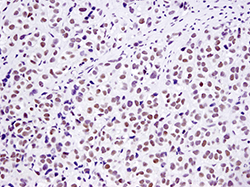Breast Cancer
Breast cancer can be driven by several different epigenetic mechanisms. Histone methylation by the Ezh2 protein drives gene silencing required for the maintenance of cell identity. Dysregulation of histone methylation leads to loss of cell identity, which in turn leads to neoplastic transformation and increased breast tumor invasiveness. Additionally, transcriptional repression due to the hypermethylation of nuclear receptor promoter regions leads to the formation of ER– and/or PR– breast cancers that are not responsive to tamoxifen. Finally, phosphorylation of ER at Ser167 promotes ER-dependent transcription and is attributed to increased resistance to tamoxifen.
Start with these targets
Ezh2
Overexpression of Ezh2 plays a role in many cancers, including breast cancer, where it adds methyl groups to H3K27 triggering gene silencing.
Products
Ezh2 (D2C9) XP® Rabbit mAb #5246 – WB, IP, IF, F, IHC, ChIP, ChIP-seq
PathScan® Total Ezh2 Sandwich ELISA Kit #13278
Immunohistochemical analysis of paraffin-embedded human lymphoma using Ezh2 (D2C9) XP® Rabbit mAb.
Chromatin immunoprecipitations were performed with cross-linked chromatin from Hela cells and either Ezh2 (D2C9) XP® Rabbit mAb or Tri-Methyl-Histone H3 (Lys27) (C36B11) Rabbit mAb, using SimpleChIP® Enzymatic Chromatin IP Kit (Magnetic Beads) #9003. DNA Libraries were prepared from 5ng enriched ChIP DNA for EZH2 ChIP-seq and 50ng enriched ChIP DNA for H3K27me3 ChIP-seq using DNA Library Prep Kit for Illumina (ChIP-seq, CUT&RUN) #56795, and sequenced on the Illumina NextSeq. EZH2 and H3K27me3 are known to associate with each other on chromatin. The figure shows binding of both EZH2 and H3K27me3 across the MYT1 gene.
UTX
UTX is a counterpart to Ezh2 that removes methyl groups from H3K27.
Products
UTX (D3Q1I) Rabbit mAb #33510 – WB, IP, IHC
Immunohistochemical analysis of paraffin-embedded human breast carcinoma using UTX (D3Q1I) Rabbit mAb.
Estrogen Receptor α and Progesterone Receptor
Mutations in nuclear receptors such as Estrogen Receptor α and Progesterone Receptor will alter gene expression and can have a huge impact on treatment options in breast cancer.
Products
Estrogen Receptor α (D8H8) Rabbit mAb #8644 – WB, IP, IF, ChIP, ChIP-seq
Estrogen Receptor α (D6R2W) Rabbit mAb #13258 – WB, IF, F, ChIP, ChIP-seq
Phospho-Estrogen Receptor α (Ser167) (D5W3Z) Rabbit mAb #64508 – WB, IF
PathScan® Total Estrogen Receptor α Sandwich ELISA Kit #80251
Progesterone Receptor A/B (D8Q2J) XP® Rabbit mAb #8757 – WB, IP, IF, F, IHC, ChIP, ChIP-seq
H3K27me3
Watch out for increased H3K27 methylation caused by Ezh2 overexpression or UTX mutation.
Products
Tri-Methyl-Histone H3 (Lys27) (C36B11) Rabbit mAb #9733 – WB, IHC, IF, F, ChIP



